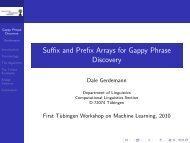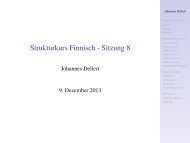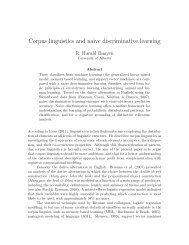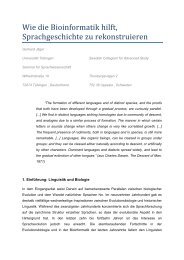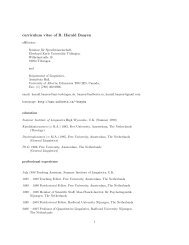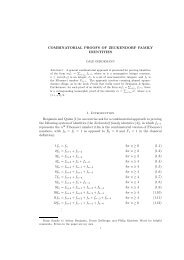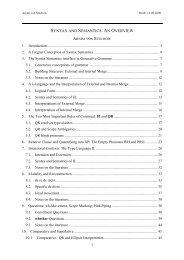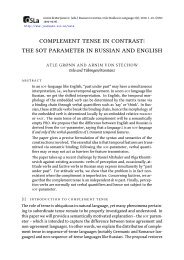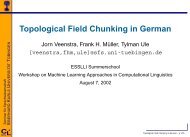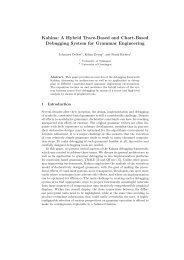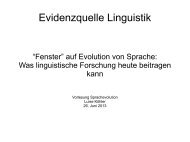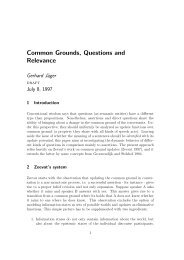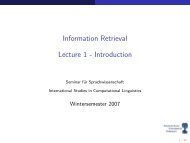A Treebank-based Investigation of IPP-triggering Verbs in Dutch
A Treebank-based Investigation of IPP-triggering Verbs in Dutch
A Treebank-based Investigation of IPP-triggering Verbs in Dutch
You also want an ePaper? Increase the reach of your titles
YUMPU automatically turns print PDFs into web optimized ePapers that Google loves.
produc<strong>in</strong>g treebank <strong>based</strong> LFG approximations for French, us<strong>in</strong>g for this a modified<br />
version <strong>of</strong> part <strong>of</strong> the FTB, where they annotated functional paths for a few<br />
cases. Clergerie [7] proposes a deep symbolic parser for French, which can recover<br />
LDDs directly (<strong>in</strong>clud<strong>in</strong>g eLDDs), but currently quantitative evaluation <strong>of</strong> LDDs<br />
for this parser rema<strong>in</strong>s to be performed. More generally, works on LDDs do not<br />
focus specifically on eLDDs, though they are the most difficult type <strong>of</strong> LDDs. For<br />
example, Rimell et al. [17] describe a 800 English sentences corpus used for the<br />
evaluation <strong>of</strong> wide coverage parsers on unbounded dependencies, but over all eight<br />
types <strong>of</strong> unbounded dependencies only one is exclusively <strong>of</strong> eLDD type.<br />
7 Conclusion<br />
We have annotated cases <strong>of</strong> effectively long distance dependencies for two French<br />
treebanks, totaliz<strong>in</strong>g over 15000 sentences. We could verify that non local dependencies<br />
are very rare <strong>in</strong> actual French texts: we annotated a non local governor for<br />
513 tokens only out <strong>of</strong> over 420000 tokens. Yet, they are massive with<strong>in</strong> the occurrences<br />
<strong>of</strong> the relative pronoun dont, and to a lesser extent que, and also frequent for<br />
the clitic en. We noted that extraction out <strong>of</strong> f<strong>in</strong>ite verbal clause is totally absent<br />
from the corpora we’ve annotated (one case only for over 15000 sentences), but<br />
extraction out <strong>of</strong> <strong>in</strong>f<strong>in</strong>itival clause accounts for one third <strong>of</strong> the occurrences <strong>of</strong> the<br />
relative pronoun que. Further only 2 thirds <strong>of</strong> annotated eLDDs give rise to non<br />
projective l<strong>in</strong>ks. As far as pars<strong>in</strong>g is concerned, the best results, both overall and<br />
on eLDDs, are obta<strong>in</strong>ed when comb<strong>in</strong><strong>in</strong>g pseudo-projectivization and MSTParser<br />
with order 2 factors and projective decod<strong>in</strong>g.<br />
References<br />
[1] Anne Abeillé and Nicolas Barrier. Enrich<strong>in</strong>g a french treebank. In Proc. <strong>of</strong><br />
LREC’04, Lisbon, Portugal, 2004.<br />
[2] Aoife Cahill, Michael Burke, Ruth O’Donovan, Josef van Genabith, and<br />
Andy Way. Long-Distance Dependency Resolution <strong>in</strong> Automatically Acquired<br />
Wide-Coverage PCFG-Based LFG Approximations. In Proc. <strong>of</strong><br />
ACL’04, pages 320–327, Barcelona, Spa<strong>in</strong>, 2004.<br />
[3] Marie Candito, Benoit Crabbé, and Pascal Denis. Statistical french dependency<br />
pars<strong>in</strong>g : <strong>Treebank</strong> conversion and first results. In Proc. <strong>of</strong> LREC’2010,<br />
Valletta, Malta, 2010.<br />
[4] Marie Candito, Joakim Nivre, Pascal Denis, and Enrique Henestroza Anguiano.<br />
Benchmark<strong>in</strong>g <strong>of</strong> statistical dependency parsers for french. In Proc.<br />
<strong>of</strong> COLING 2010, pages 108–116, 2010.<br />
71



